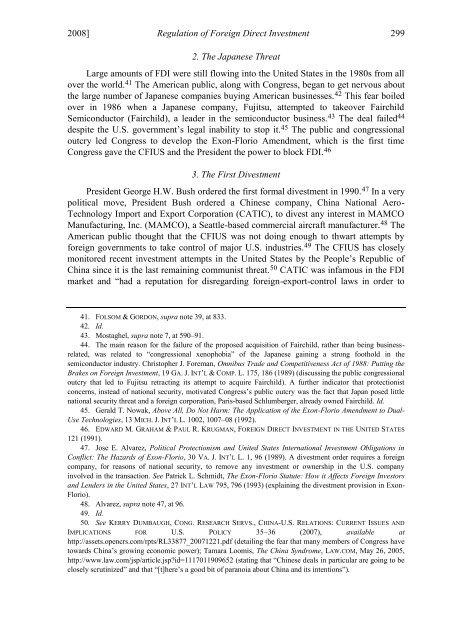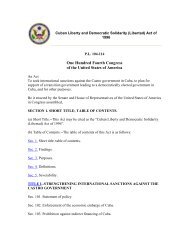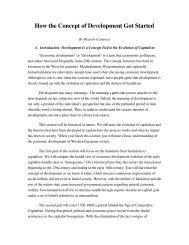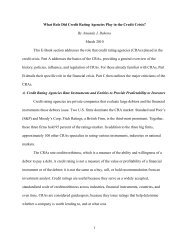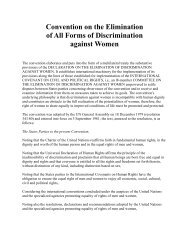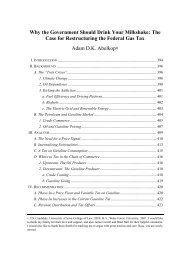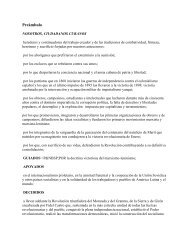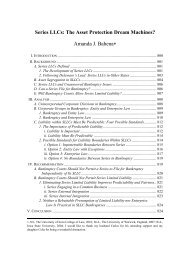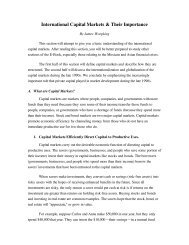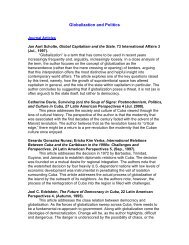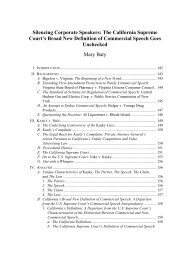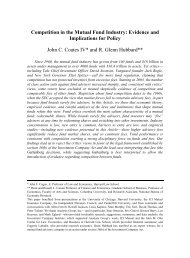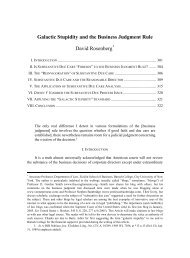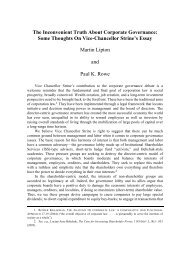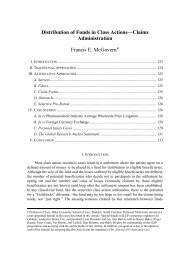Regulation of Foreign Direct Investment After the Dubai Ports ...
Regulation of Foreign Direct Investment After the Dubai Ports ...
Regulation of Foreign Direct Investment After the Dubai Ports ...
You also want an ePaper? Increase the reach of your titles
YUMPU automatically turns print PDFs into web optimized ePapers that Google loves.
2008] <strong>Regulation</strong> <strong>of</strong> <strong>Foreign</strong> <strong>Direct</strong> <strong>Investment</strong> 299<br />
2. The Japanese Threat<br />
Large amounts <strong>of</strong> FDI were still flowing into <strong>the</strong> United States in <strong>the</strong> 1980s from all<br />
over <strong>the</strong> world. 41 The American public, along with Congress, began to get nervous about<br />
<strong>the</strong> large number <strong>of</strong> Japanese companies buying American businesses. 42 This fear boiled<br />
over in 1986 when a Japanese company, Fujitsu, attempted to takeover Fairchild<br />
Semiconductor (Fairchild), a leader in <strong>the</strong> semiconductor business. 43 The deal failed 44<br />
despite <strong>the</strong> U.S. government‘s legal inability to stop it. 45 The public and congressional<br />
outcry led Congress to develop <strong>the</strong> Exon-Florio Amendment, which is <strong>the</strong> first time<br />
Congress gave <strong>the</strong> CFIUS and <strong>the</strong> President <strong>the</strong> power to block FDI. 46<br />
3. The First Divestment<br />
President George H.W. Bush ordered <strong>the</strong> first formal divestment in 1990. 47 In a very<br />
political move, President Bush ordered a Chinese company, China National Aero-<br />
Technology Import and Export Corporation (CATIC), to divest any interest in MAMCO<br />
Manufacturing, Inc. (MAMCO), a Seattle-based commercial aircraft manufacturer. 48 The<br />
American public thought that <strong>the</strong> CFIUS was not doing enough to thwart attempts by<br />
foreign governments to take control <strong>of</strong> major U.S. industries. 49 The CFIUS has closely<br />
monitored recent investment attempts in <strong>the</strong> United States by <strong>the</strong> People‘s Republic <strong>of</strong><br />
China since it is <strong>the</strong> last remaining communist threat. 50 CATIC was infamous in <strong>the</strong> FDI<br />
market and ―had a reputation for disregarding foreign-export-control laws in order to<br />
41. FOLSOM & GORDON, supra note 39, at 833.<br />
42. Id.<br />
43. Mostaghel, supra note 7, at 590–91.<br />
44. The main reason for <strong>the</strong> failure <strong>of</strong> <strong>the</strong> proposed acquisition <strong>of</strong> Fairchild, ra<strong>the</strong>r than being businessrelated,<br />
was related to ―congressional xenophobia‖ <strong>of</strong> <strong>the</strong> Japanese gaining a strong foothold in <strong>the</strong><br />
semiconductor industry. Christopher J. Foreman, Omnibus Trade and Competitiveness Act <strong>of</strong> 1988: Putting <strong>the</strong><br />
Brakes on <strong>Foreign</strong> <strong>Investment</strong>, 19 GA. J. INT‘L & COMP. L. 175, 186 (1989) (discussing <strong>the</strong> public congressional<br />
outcry that led to Fujitsu retracting its attempt to acquire Fairchild). A fur<strong>the</strong>r indicator that protectionist<br />
concerns, instead <strong>of</strong> national security, motivated Congress‘s public outcry was <strong>the</strong> fact that Japan posed little<br />
national security threat and a foreign corporation, Paris-based Schlumberger, already owned Fairchild. Id.<br />
45. Gerald T. Nowak, Above All, Do Not Harm: The Application <strong>of</strong> <strong>the</strong> Exon-Florio Amendment to Dual-<br />
Use Technologies, 13 MICH. J. INT‘L L. 1002, 1007–08 (1992).<br />
46. EDWARD M. GRAHAM & PAUL R. KRUGMAN, FOREIGN DIRECT INVESTMENT IN THE UNITED STATES<br />
121 (1991).<br />
47. Jose E. Alvarez, Political Protectionism and United States International <strong>Investment</strong> Obligations in<br />
Conflict: The Hazards <strong>of</strong> Exon-Florio, 30 VA. J. INT‘L L. 1, 96 (1989). A divestment order requires a foreign<br />
company, for reasons <strong>of</strong> national security, to remove any investment or ownership in <strong>the</strong> U.S. company<br />
involved in <strong>the</strong> transaction. See Patrick L. Schmidt, The Exon-Florio Statute: How it Affects <strong>Foreign</strong> Investors<br />
and Lenders in <strong>the</strong> United States, 27 INT‘L LAW 795, 796 (1993) (explaining <strong>the</strong> divestment provision in Exon-<br />
Florio).<br />
48. Alvarez, supra note 47, at 96.<br />
49. Id.<br />
50. See KERRY DUMBAUGH, CONG. RESEARCH SERVS., CHINA-U.S. RELATIONS: CURRENT ISSUES AND<br />
IMPLICATIONS FOR U.S. POLICY 35 36 (2007), available at<br />
http://assets.opencrs.com/rpts/RL33877_20071221.pdf (detailing <strong>the</strong> fear that many members <strong>of</strong> Congress have<br />
towards China‘s growing economic power); Tamara Loomis, The China Syndrome, LAW.COM, May 26, 2005,<br />
http://www.law.com/jsp/article.jsp?id=1117011909652 (stating that ―Chinese deals in particular are going to be<br />
closely scrutinized‖ and that ―[t]here‘s a good bit <strong>of</strong> paranoia about China and its intentions‖).


